Can more civilian involvement improve how police are disciplined? L.A. is about to find out
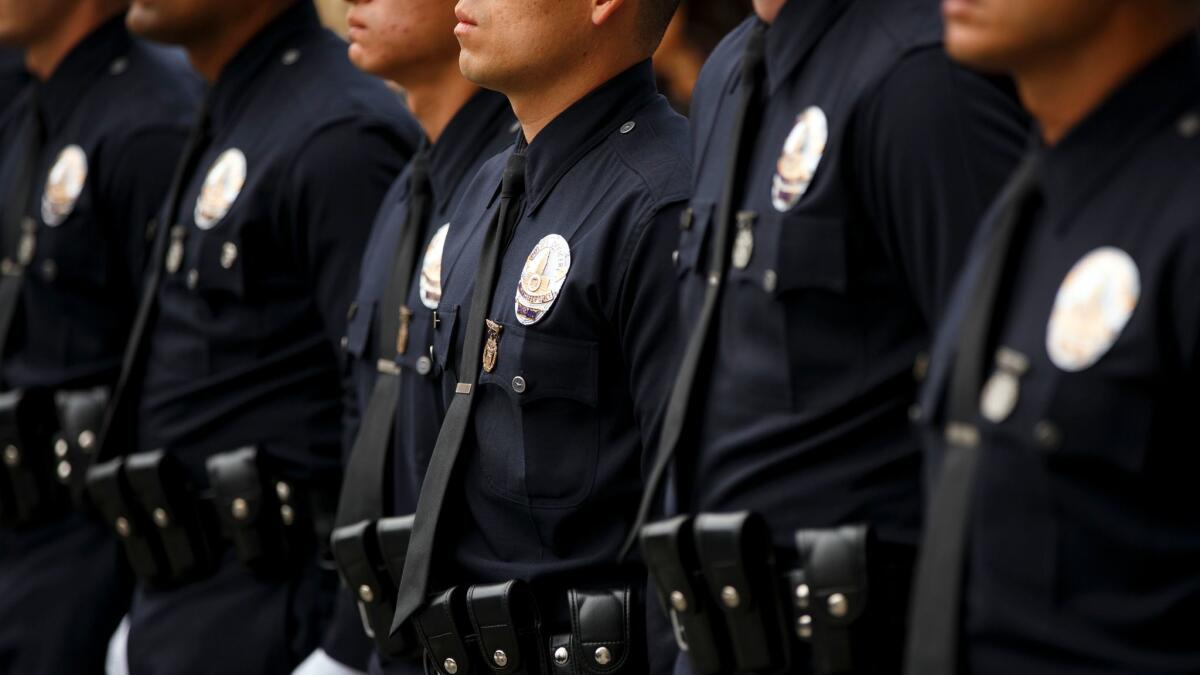
- Share via
Los Angeles first gave civilians a say in disciplining police officers during a time of crisis.
The city was reeling from the grainy video showing the pummeling of Rodney King, the acquittals of the four officers who carried out the beating and the riot that followed. Adding a civilian voice to the disciplinary process was proposed as an essential check against lenient decisions made in a department that often rejected complaints of excessive force.
Some LAPD officers bristled at the idea of outsiders judging their actions. But voters overwhelmingly chose to put a civilian on the three-person Board of Rights panels that decide the fate of officers facing termination or lengthy suspensions.
Twenty-five years later, Los Angeles voters on Tuesday approved an expansion of civilian influence over police discipline that was proposed under sharply different circumstances.
This time, it was the police officers’ union pushing for the change, believing more civilian involvement was better for officers than being judged by other cops.
Charter Amendment C allows officers to have their cases heard by all-civilian boards, an option long sought by the union representing the LAPD’s rank-and-file amid complaints that the chief could unfairly influence a panel’s sworn officers.
It’s a remarkable turnaround in the decades-old debate over how to discipline L.A.’s police officers. In 1992, it was police reformers calling for more civilian oversight, believing outsiders would be more likely to hold cops accountable. But now, many department critics oppose the change, arguing that civilians have turned out to be more lenient in deciding discipline.
With Charter Amendment C’s approval, the stakes are high. How officers are held accountable for their actions has become a focal point in the national debate about law enforcement, drawing extra scrutiny after high-profile police shootings. In L.A., the Police Commission is making a push to reduce shootings by officers and now takes into account whether officers did everything they could to avoid pulling the trigger when deciding whether a shooting was justified.
“The reason for more civilian oversight in 1992 was the belief that civilians were going to be tougher on officers,” said Richard Drooyan, a former Police Commission president who served as an attorney to the panel that investigated King’s beating and on another that reviewed the subsequent Rampart scandal. “More civilian oversight may swing the disciplinary pendulum in a different direction.”
The measure’s impact, Drooyan said, will largely be determined by how tough the civilian panelists are on accused officers. It also depends, he said, on how those civilians are selected, who they are and what sort of experience they have.
Charter Amendment C marks the latest attempt to revamp a disciplinary system that has long been accused of being too soft or unfairly harsh toward officers — and sometimes faced both accusations from different groups at the same time.
1930s
An era of corruption in the LAPD
The 1933 election of Frank Shaw as the city’s mayor effectively left the Police Department under the control of his brother, who sold jobs and promotions while strengthening relationships with L.A.’s seedy underbelly. Vice officers offered prostitution and gambling rings advance warnings about raids for a price. One madam notoriously kept chilled champagne and Russian caviar on hand for the officers when they arrived.
A police lieutenant named William Parker — who later would become one of the most influential and controversial chiefs in the LAPD’s history — worried that city-endorsed corruption left officers vulnerable to being fired if they insisted on following the law.
Parker proposed a disciplinary system that resembled a military tribunal to better protect police jobs. The police chief could not fire an officer at will; instead, his attempt to do so would be reviewed by a panel of three high-ranking officers, who would come up with their own recommendation after hearing the evidence against an accused officer. The chief could reduce the panel’s proposed penalty, but not increase it.
In 1934, voters narrowly passed an amendment — by 676 votes — to the City Charter creating the disciplinary boards. In the same election, voters shot down a proposal to allow Sunday dances at dance halls.
Decades later, the boards would come under fire for doling out lax punishments to officers found guilty of using excessive force or other serious misconduct.
1991
Rodney King’s beating launches change
The 1991 beating of King once again focused the city’s attention on how its police department handled misconduct.
A commission led by diplomat Warren Christopher produced a blistering, 228-page report that found that the LAPD often ignored complaints about officers. When the agency did investigate, the report said, the vast majority of inquiries into accusations of excessive force and other misconduct sided in favor of officers. Out of 2,152 allegations of excessive force made during a four-year period, only 42 were upheld.
“The current system of discipline does not work,” the commission wrote.
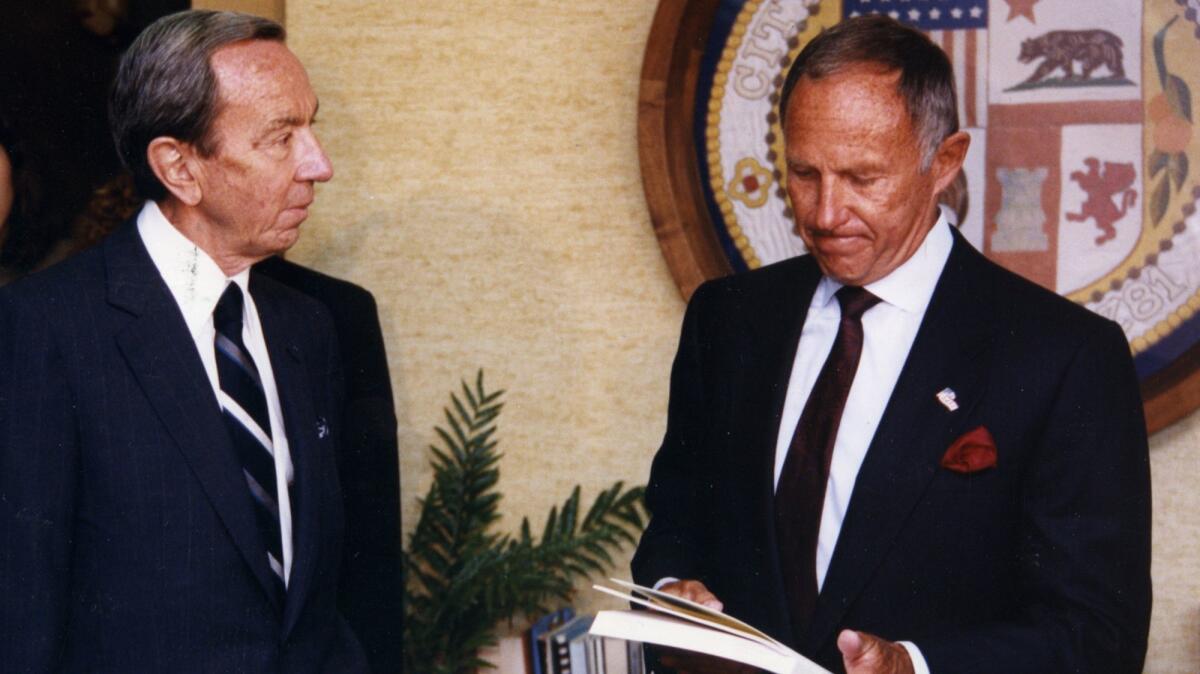
To address some of those concerns, the commission proposed expanding civilian oversight of discipline.
Although the police chief was responsible for imposing punishments, the civilian members of the Police Commission should be able to oversee the disciplinary process and hold the chief accountable for his decisions, the report said. For the most serious cases heard by a Board of Rights, the Christopher Commission suggested that making one of the three panelists a civilian would bring a “detached perspective” and a more rigorous review of the evidence.
Less than a year later, L.A. voters overwhelmingly passed Charter Amendment F, a police reform effort inspired by some of the Christopher Commission’s findings. Since then, the three-person Board of Rights panels have been made up of two high-ranking officers and one civilian.
Hired by the Police Commission and paid for their work, the civilians must have at least seven years of experience in arbitration-like work. Most are attorneys or professional arbitrators.
1997-2002
A new scandal and new focus on officer behavior
The Christopher Commission urged the LAPD to take minor misconduct seriously, listen to residents’ complaints about officers and better track accusations levied against cops.
Bernard C. Parks, the veteran insider appointed as chief in 1997, embraced the approach. Parks reformed discipline to ensure that all complaints were documented and investigated, no matter how small.
The number of complaints exploded. By 2002, nearly 6,000 complaint investigations were initiated annually in the 9,000-officer force, with penalties affecting, on average, almost 1 out of every 3 officers.
Parks said his method could help improve trust in police by showing residents the department was listening to their concerns.
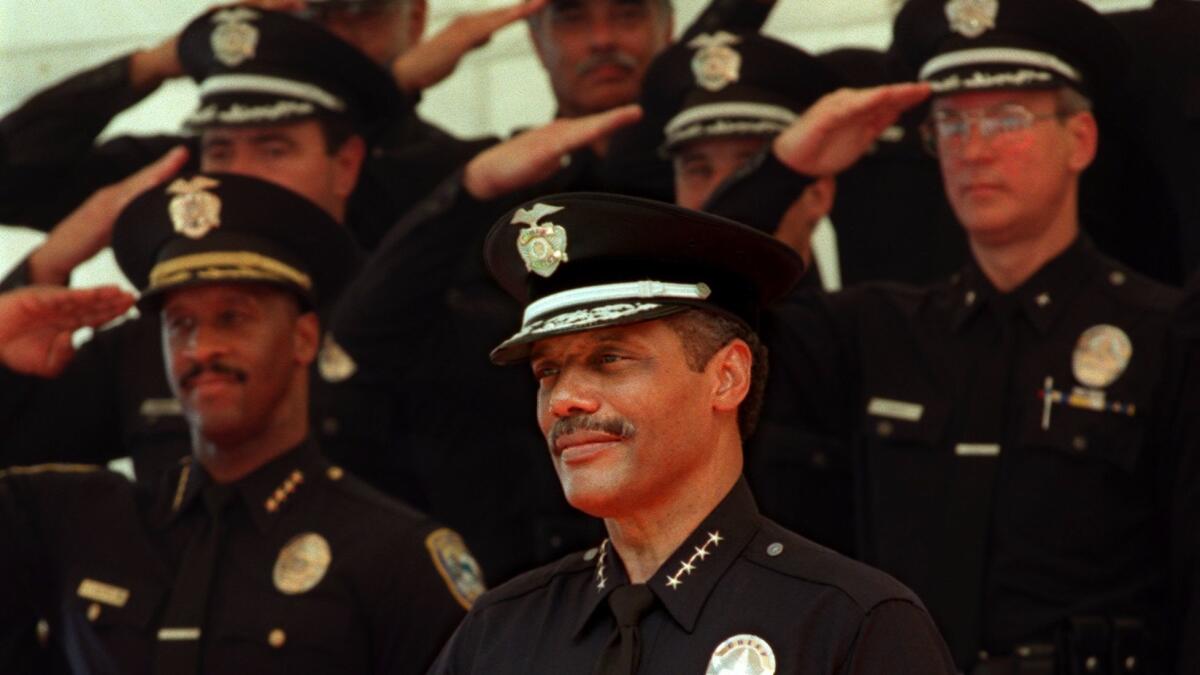
The changes coincided with another scandal that engulfed the department. Accusations that officers in the Rampart Division had beaten suspects, planted evidence, stolen drugs and lied under oath inspired a fresh look at how officers behaved.
But opponents said Parks’ system went too far, investigating officers for what they considered to be frivolous complaints, such as being discourteous or leaving a shift early. Some civil liberties advocates wondered whether the LAPD was too focused on minor misconduct instead of more serious problems.
Accounting for public complaints, including those that do not necessarily amount to misconduct, can raise the department's credibility with the public.
— September 1998 newsletter from Chief Bernard Parks' office to LAPD rank-and-file
Most of the complaints involved allegations of minor wrongdoing, ending with nothing more than an admonition as punishment. Relatively few rose to the level of a Board of Rights. In 2001, a year before Parks was denied a second term as chief, the board heard 226 cases out of thousands investigated; 32 officers were fired.
Still, when disciplinary cases did go before the boards, some officers accused Parks of trying to influence the outcome of the hearings, saying commanders on the boards could be intimidated by the chief.
The union’s suggestion? Add more civilians to the boards.
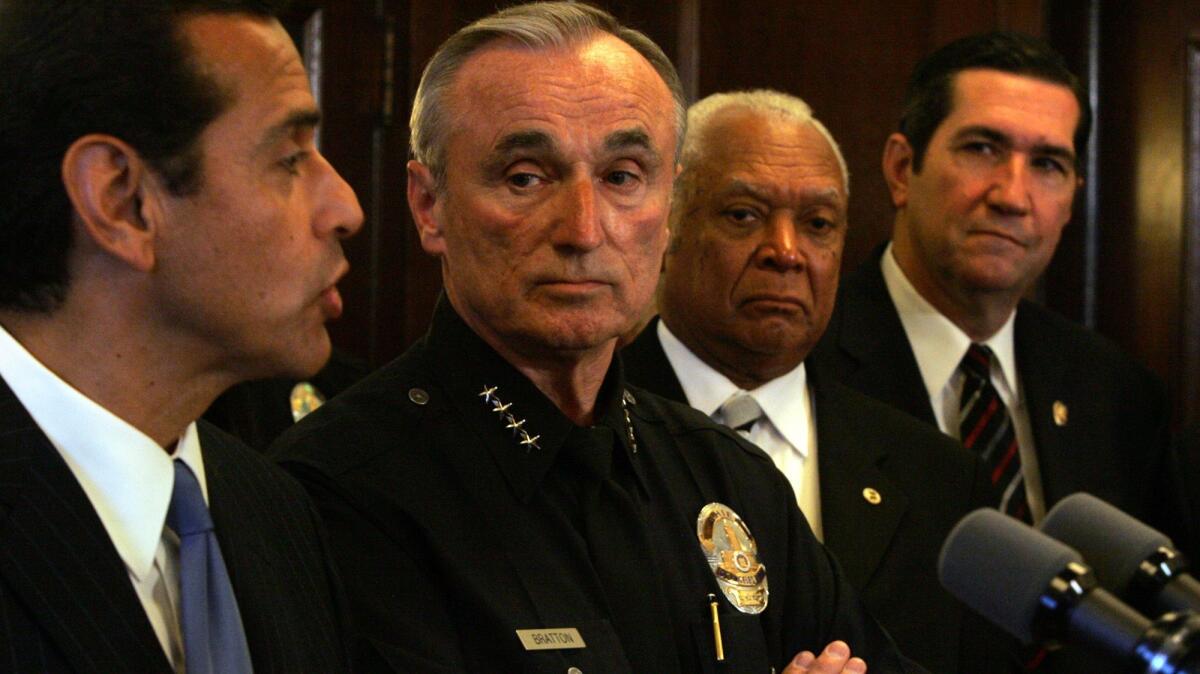
2002-2009
The Bratton years
William J. Bratton’s seven-year tenure as L.A.’s police chief saw increased scrutiny of the Board of Rights process, particularly after high-profile cases in which disciplinary panels let officers accused of misconduct go unpunished.
Perhaps the most controversial example came in 2003, when a disciplinary board determined that an LAPD officer was justified in shooting a mentally ill homeless woman brandishing a screwdriver. The 1999 killing of Margaret Mitchell had sparked protests and accusations of excessive force.
Though Parks, who was chief when Mitchell was killed, said he believed the shooting fell within LAPD policy, the Police Commission disagreed, ruling in a 3-2 vote that the officer violated department rules and should face discipline.
A Board of Rights, however, decided that the officer had acted properly and would not face disciplinary action.
The cold, hard reality of Los Angeles is that as chief of police, I lack the necessary ability to control and impose discipline on my staff.
— then-LAPD Chief William J. Bratton, in a 2003 column published by The Times
Because LAPD chiefs cannot increase a penalty suggested by a disciplinary board, Bratton’s hands were tied. He and the Police Commission’s president called for an overhaul to the disciplinary system, one that Bratton said should put more power in the hands of the chief.
“The cold, hard reality of Los Angeles is that as chief of police, I lack the necessary ability to control and impose discipline on my staff,” Bratton wrote in a column published in The Times.
Four years later, a disciplinary panel decided not to punish an LAPD officer in another controversial shooting: the killing of 13-year-old Devin Brown. The Police Commission and Bratton split on whether the officer was justified in shooting the boy, who police said tried to back a stolen car into the officer. Bratton said the shooting fell within policy, but the commission determined it did not.
A Board of Rights decision to clear the cop prompted outcry.
Bratton said he supported the ruling, but days later called for greater public access to disciplinary hearings. The Board of Rights hearings had been closed to the public after the state Supreme Court ruled in 2006 that information about discipline was confidential under state laws protecting police privacy.
2009-present
A changing philosophy and more controversy
Beginning under Bratton and continuing after Charlie Beck became chief in 2009, the LAPD embarked on a new, unconventional way of handling misbehavior by officers that focused on changing the way they thought and acted.
Some officers who previously would have faced suspension were now given warnings known as “conditional official reprimands.” An officer who received such a reprimand was warned that repeat behavior would result in a harsh penalty — and potentially, termination.
When weighing officer misconduct, Beck said he looks at whether the officer’s actions were what he considers a “mistake of the heart” or a “mistake of the mind.” Mistakes of the mind are accidents that can be fixed through training, he said. But intentional acts, he believes, those mistakes of the heart, represent qualities he does not want in his police officers.
“To me, it’s very much about why does somebody do something wrong,” Beck said in a recent interview.
The reprimands, however, raised eyebrows among some police commissioners, who worried the department was too lenient on officers accused of serious misconduct. Other cases also prompted questions from commissioners, including one involving a well-connected officer.
Beck had spared the career of Officer Shaun Hillmann after he was recorded uttering a racial slur during an off-duty confrontation outside a Norco bar. A Board of Rights panel said the officer should be fired, but Beck disagreed, suspending Hillmann for 65 days instead.
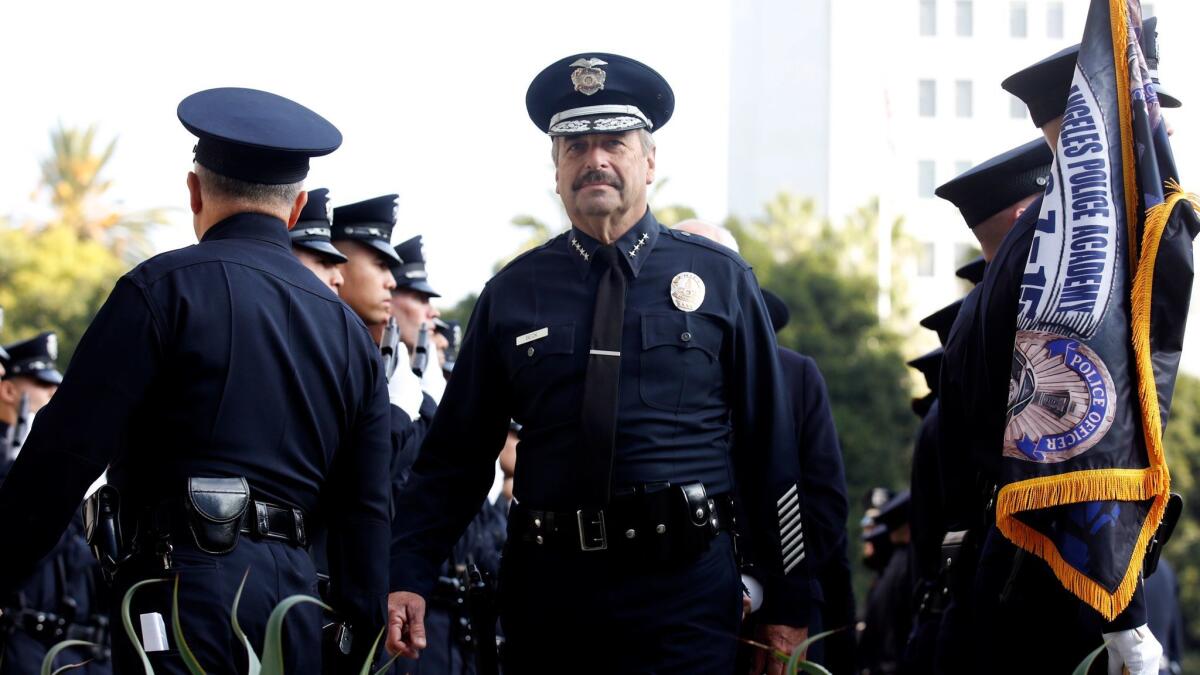
In 2013, the LAPD began surveying officers about their views of the disciplinary system. The review was initiated after Christopher Dorner, a former LAPD officer, accused the department of unfairly firing him and went on a retaliatory rampage, killing four people and wounding several others.
Though Dorner’s actions were widely condemned — and an internal review later concluded the unanimous decision by a Board of Rights to fire him was just — his complaints about the disciplinary system resonated with many officers who also believed the process was not fair.
The department has tried to make some adjustments. It stopped using the controversial reprimands. And last year, it adopted new guidelines that spelled out punishments officers could face for various offenses.
But for the union, the changes didn’t go far enough.
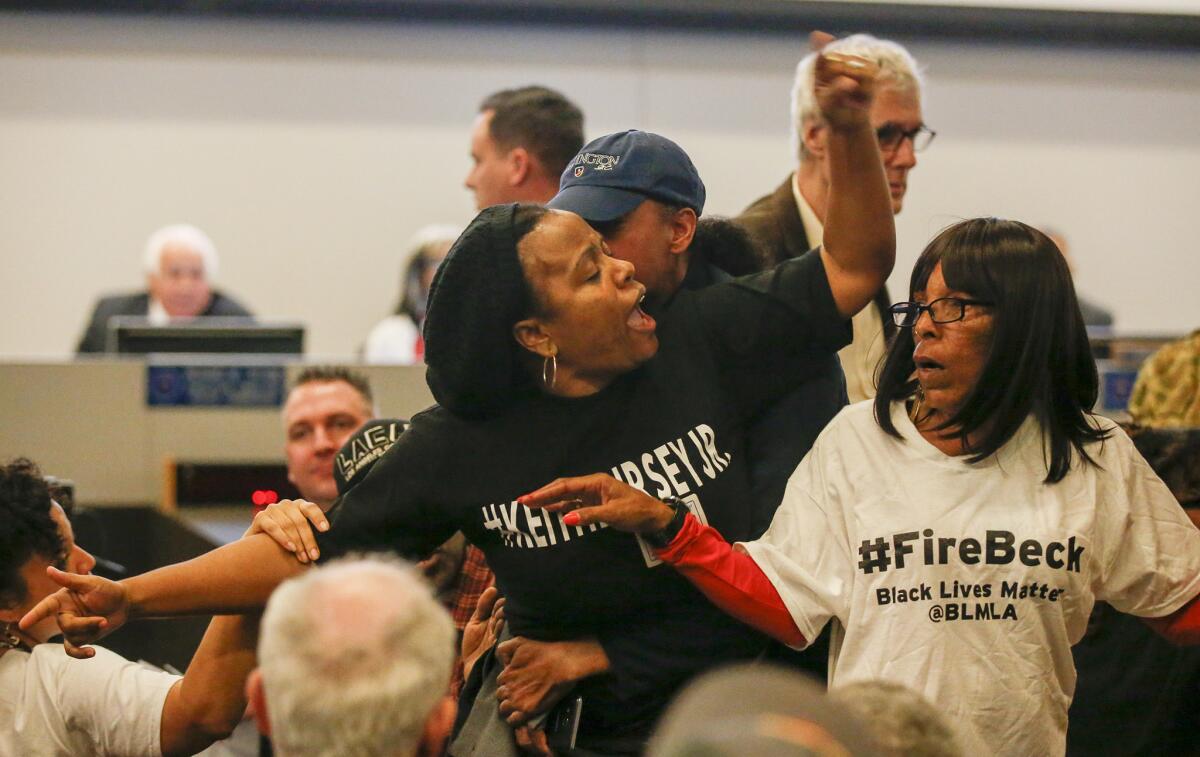
2017
Charter Amendment C
In campaigning for Charter Amendment C, the police union argued that officers felt they weren’t treated fairly by a disciplinary panel on which two-thirds of the members work under a police chief who is suggesting serious punishment. Allowing the option of all-civilian disciplinary panels, union officials said, would help assure officers that they’d get a fair hearing.
But opponents argued that Charter Amendment C could instead result in more lenient treatment of misbehaving LAPD officers, pointing to a city report that concluded civilians are less severe than their sworn counterparts when weighing disciplinary cases.
The report, prepared for city lawmakers using LAPD data, looked at 287 Board of Rights hearings from 2011 to late 2016 and found that the civilian panelists were “consistently more lenient” than the sworn members. The numbers included 39 cases in which Beck had suggested an officer be fired, but a board acquitted the officer instead. In all of those cases, the report said, the civilian voted to acquit.
Union officials countered that the cases were rarely decided by a divided vote. Out of 229 cases in which Beck recommended termination, just 7% involved decisions in which the civilian member was more lenient than at least one of his or her sworn counterparts.
There were no cases in which a civilian voted for a harsher outcome.
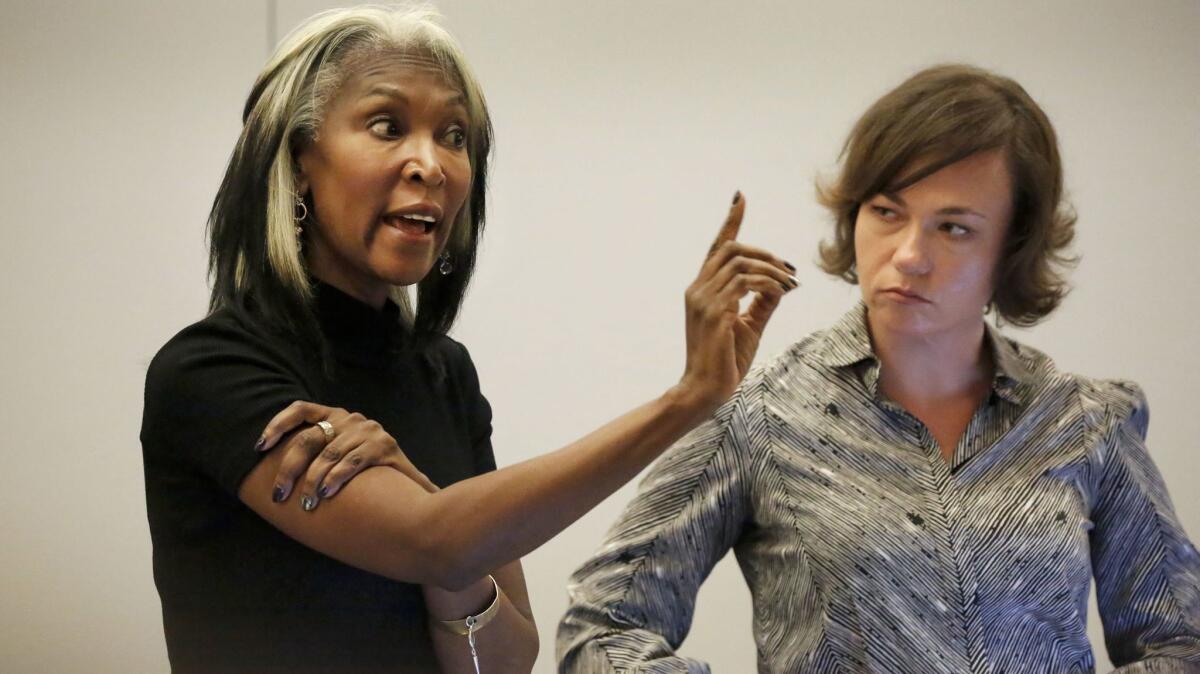
For more news about the Los Angeles Police Department, follow me on Twitter: @katemather
Sign up for Essential California
The most important California stories and recommendations in your inbox every morning.
You may occasionally receive promotional content from the Los Angeles Times.








